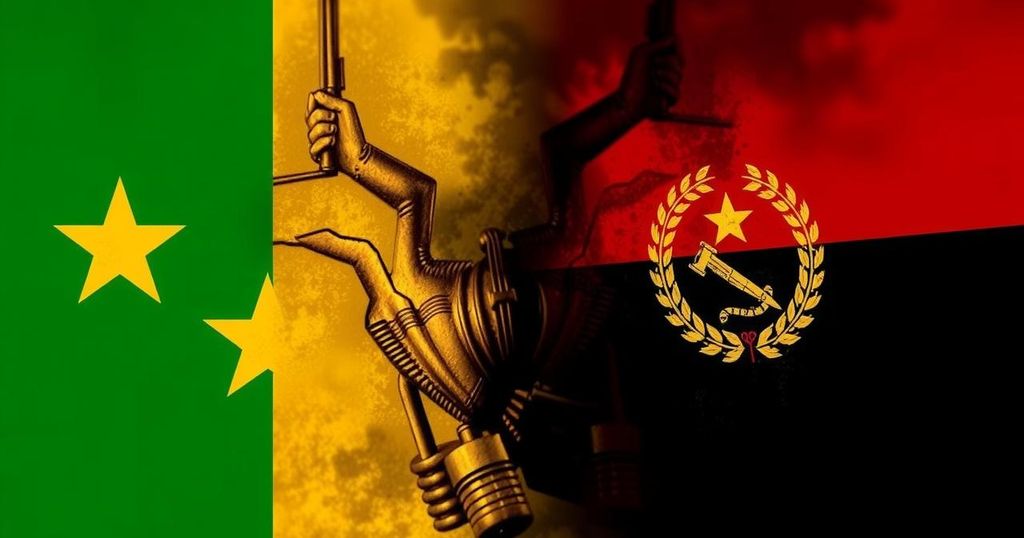Angola Responds to Renewed Violence in Eastern DRC Amid Peace Efforts
Angola has expressed serious concerns following renewed violence in eastern DRC, condemning it as a violation of the ceasefire established on August 4. Recent conflicts involved the Wazalendo self-defense group and M23 rebels in Kalembe, raising questions about the adherence to previously agreed peace efforts between the DRC and Rwanda. Angola calls for respect for the ceasefire to address the mounting humanitarian crisis affecting millions of displaced civilians.
Renewed hostilities in the eastern Democratic Republic of Congo (DRC) have drawn strong condemnation from the Angolan government, which had been advocating for a prolonged ceasefire following a month of relative calm. In a press release issued on Tuesday, the Angolan authorities characterized the recent outbreak of violence as a blatant breach of the ceasefire agreement that commenced on August 4, shortly after a ministerial meeting on July 30 aimed at fostering a peaceful resolution to the conflict. Angola has taken on a mediating role between the DRC and Rwanda amid accusations from both nations regarding each other’s support for groups inciting unrest. Recent discussions in Luanda, which involved pledges for peaceful negotiations, revealed a commitment from Kinshasa to ensure that the FDLR rebels do not receive support from the Congolese army, contingent upon Rwanda halting its backing of the M23 group. In its response to the violence, Angola firmly denounced the actions that disrupt the peace process and reiterated the importance of adhering to the established ceasefire. The latest clashes have been reported near Kalembe, where the local self-defense group, Wazalendo, engaged forces affiliated with the M23. Despite these confrontations, the Congolese army has reportedly managed to reclaim control over the town. Former MP Juvenal Munubo has indicated that the NDC Rénové armed group has resumed control in Kalembe with support from the Congolese army, calling for consolidation of this military success. MP Willy Mishiki noted the rebels’ aspirations to expand control into other eastern provinces, prompting dissatisfaction regarding the lack of comment from Kinshasa on the recent violations of the truce. As the ceasefire had initially shown promise, resulting in some displaced individuals returning home, the DRC has ruled out addressing the M23 through dialogue while renegotiations are in progress between the DRC and Rwanda. During the recent foreign ministers’ meeting, both nations agreed to progress on outstanding security matters and to establish a verification mechanism to oversee peace efforts, set to be officially launched in Goma by November 5, 2024. The violence has had severe ramifications for civilians, with at least 14 injured and an increasing number of individuals fleeing their homes. The United Nations High Commissioner for Human Rights anticipates that approximately 940,000 individuals will be displaced in 2024 alone, compounding nearly seven million total displaced people within the DRC due to ongoing conflict and humanitarian crisis.
The article discusses the escalating violence in the eastern Democratic Republic of Congo (DRC) and its implications for regional stability, particularly concerning Angola’s mediating role. After a month of relative peace, the resumption of fighting raises significant concerns for humanitarian conditions in the region, which has been troubled by prolonged conflict and displacement of civilians. The article highlights the interactions among Angola, the DRC, and Rwanda, exploring the complex dynamics at play in the quest for a sustainable peace agreement.
The renewed violence in eastern DRC underscores the fragility of the ceasefire agreement previously established, posing severe challenges to ongoing peace negotiations. Angola, playing a critical mediating role, emphasizes the need for all parties to respect the ceasefire and seek a lasting resolution. The humanitarian crisis continues to worsen, with a concerning increase in the number of displaced individuals forecasted for the near future. Continued dialogue and adherence to peace initiatives remain essential for restoring stability in the region.
Original Source: www.theeastafrican.co.ke




Post Comment